As a nutrition consultant specialising in infant health, I often encounter parents eager to introduce solid foods to their babies before they've displayed the essential developmental signs of readiness. While it's exciting to witness your little one's growth, waiting for these cues indicates when a baby’s intricate system is ready and mature enough for the introduction of solid foods.
Here are the key reasons why it's important to hold off on introducing solids until your baby is developmentally ready:
1. Better Digestion:
Allowing the digestive system to mature: Babies are born with immature digestive systems. Waiting for developmental signs, such as the ability to sit up unassisted and a reduced tongue-thrust reflex, ensures that your baby's digestive system has had time to develop adequately.
2. Stronger Intestinal Walls:
Creating a stronger intestinal wall barrier: Starting solids too early can potentially harm your baby's delicate intestinal lining. Waiting for signs of readiness gives their body the necessary time to strengthen the intestinal walls, reducing the risk of damage and promoting better absorption of nutrients.
3. Reduced Risk of Food Allergies/Food Sensitivities:
Introducing solids too early may overwhelm your baby's digestive and immune system, increasing their susceptibility to allergies. A strong and well-functioning gastrointestinal tract serves as a protective barrier, preventing undigested food particles, toxins, and microbes from entering the bloodstream. However, if this lining weakens or sustains damage, it can allow these food particles to "leak" into the bloodstream, triggering an inflammatory response that can lead to the development of eczema, food allergies or food sensitivities.
4. Immune Protection:
Waiting for developmental signs is a form of natural immune protection. Breast milk or formula provides essential nutrients and antibodies that bolster your baby's immune system during the first months of life. Delaying solids allows your baby to continue receiving these critical immune-supporting benefits. Additionally, if the mother is breastfeeding, it helps maintain the mother's milk supply (which will still remain the primary source of nourishment for at least the first 12 months of the baby’s life.
Patience is key when it comes to introducing solids to your baby's diet. Waiting for the developmental signs of readiness not only ensures better digestion and a stronger intestinal barrier but also reduces the risk of food allergies and offers vital immune protection. Remember that each baby develops at their own pace, so paying attention to your child's individual cues is essential for their health and well-being. If you want to learn more about safe baby feeding practices, we invite you to join an upcoming online webinar.
Fiona Agius
Holistic Nutrition Consultant
@mothernurtured_








